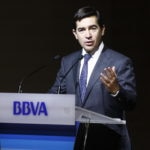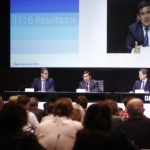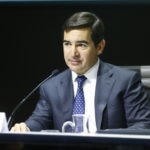Carlos Torres Vila: “Our aim is to develop a banking model that makes a bigger difference in our customers’ lives”
BBVA CEO Carlos Torres Vila said today that the sustainability of the banking business model in the current context of negative interest rates requires a change: To leave behind a money-centric infrastructure, based on revenues generated by interests, and develop a banking model that seeks to make a bigger difference in customers' lives. Speaking during BBVA’s Q1 2016 results presentation, Carlos Torres Vila expressed his conviction that “the more we are capable of offering a distinctive value, the more satisfied customers will be and the more viable and sustainable our business model will be.”

BBVA’s CEO assured that “branches are essential elements in our relationship with customers” within this new banking model and that they bring a “competitive advantage” over new players. The reason is simple: “This is the place were higher value-added operations take place.”
Carlos Torres Vila detailed a comprehensive banking model where branches, digital channels and a remote channel with bank representatives offer customers the possibility to perform operations without needing to visit an office. The BBVA CEO insisted that the only adjustment plan that BBVA is considering in Spain, besides the dynamic management of the branch network, is Catalunya Banc’s integration, a plan that was unveiled in July 2015.
Carlos Torres Vila: The more we are capable of offering a distinctive value, the more satisfied customers will be and the more viable and sustainable our business model will be
Carlos Torres Vila said that the bank’s digitization process has to help "customers make better decisions” in their everyday lives. With this goal in mind, BBVA is rolling out new digital features every three months and they are already having an impact in terms of product selling through digital channels, compared to total sales: In the U.S. digital sales reached 18.7% during the first-quarter of the year (compared to 9.3% in 2015); in South America 16.5% (up from 8.7% last year) and in Spain and Mexico 12.1% and 3.9%, respectively (from 8.8% and 2.1% in 2015). "The key here is the trend, which is clearly on the rise,” he said.

From left to right: Jaime Sáenz de Tejada, BBVA Director of Finance; Carlos Torres Vila, BBVA CEO; and Paul G. Tobin, Communications Director - BBVA
Results will increase
Regarding first-quarter results, BBVA CEO expressed his conviction that they “will continue to grow gradually throughout” 2016. The Group's net attributable profit was €709 million, down 53.8% from the same period of 2015.
Earnings were marked by the seasonal effect of the banking activity – slower during the first months of the year -, the impact of exchange rates, and lower impairment losses on financial assets in Spain. But the most defining element to understand the year-on-year comparison are the lack of corporate operations, just as BBVA CEO, Carlos Torres Vila, and CFO, Jaime Sáenz de Tejada both explained: Q1 2015 results were bolstered by the capital gains on the sale of BBVA’s 5.6% stake in Chinese bank CNCB. Also, the first-three months of 2015 were extraordinarily good in terms of NTI, while in 2016, markets have been riddled with a substantial level of volatility.
Negative Euribor and floor clauses
Carlos Torres Vila explained that “due to the nature of the contract in Spain, we do not envisage a scenario where customers could be expected to receive an interest from the bank (on their mortgages).” In the most extreme case, he said, customers may end up paying zero interest on those loans.
He also made reference to the ruling by the European Court of Justice (ECJ), - expected to be issued in the coming months - regarding a possible retroactivity of floor clauses. BBVA CEO considers that the Spanish Supreme Court’s decision of May 2013 – adopted unanimously in a plenary session, and after which BBVA removed all floor clauses from its mortgages – abides to European law.

Carlos Torres Vila, BBVA CEO - BBVA
Proud of not having advertised with Ausbanc
With respect to the controversy that has surrounded Ausbanc in recent weeks, Carlos Torres Vila emphasized that BBVA had always declined to advertise with Ausbanc companies and publications. “A while back we realized that it wasn’t an organization focused on defending consumers, but something else.” That’s why we “acted accordingly” and I can now say that at BBVA, we’re proud of not having advertised with Ausbanc. This action is “very much in line with the bank’s policy on good practices, on this topic and in many others and I believe you will find that BBVA has acted differently,” he explained.
Limited economic impact of political uncertainty
To conclude, Carlos Torres Vila made reference to the political scenario in Spain and its impact on the economy. According to BBVA CEO, after months without political agreement, economic indicators (consumer activity, internal demand, employment…) do not differ from what BBVA estimated a few months ago. BBVA Research expects Spain’s GDP to grow 0.8% during the first quarter of 2016, in line with Q4-15.
In this respect, he explained that, despite political uncertainty, the economy is still growing, driven partly by the ECB’s extremely lax monetary policy and dwindling oil prices. However, he pointed out that "we are seeing that some investment projects are starting to slow down and that the activity coming from the corporate world may ultimately bear the biggest impact.”